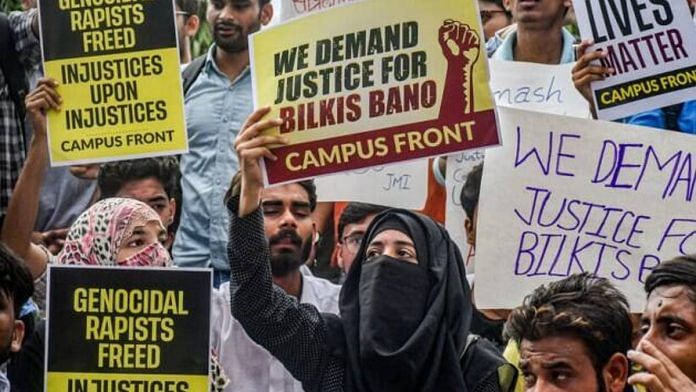New Delhi: The Gujarat government defended its decision to release 11 life convicts in the Bilkis Bano gangrape-cum-murder case in the Supreme Court Thursday, arguing that the commission of a heinous crime does not debar one from getting the benefits of remission.
Advancing submissions on behalf of the state, Additional Solicitor General S.V. Raju said: “A person may have committed the offence… in that moment something may have gone wrong. Later, he can always realise the consequences. This can largely be determined from the conduct (of the convict) in jail, when released on parole, or furlough.”
He added: “All these (convicts) show that they have realised what they have done is wrong.”
Raju placed the state’s view before a bench led by Justice B.V. Nagarathna, which is hearing Bano’s petition against the release of the 11 convicts.
The law officer’s arguments, however, prompted the bench to question the state’s discretion in granting remission and wondered if it applied the reformative theory equally to all convicts. “How far is it (remission policy) being applied to inmates in jail? Why are our jails overcrowded, particularly by undertrials?” the bench asked Raju.
Bano’s petition, filed through advocate Shobha Gupta, had questioned the convicts’ release according to the Gujarat government’s 1992 policy.
Bano was 19 and five months pregnant when she was gangraped while fleeing communal violence in Gujarat during the 2002 riots. Her three-year-old daughter was among 14 members of her family who were killed by a mob in the state’s Randhikpur village at the time.
The 11 men convicted in the case were released prematurely by the Gujarat government on 15 August, 2022. This was after the Supreme Court in May 2022, on a petition filed by one of the convicts, directed the state to consider the petitioner’s plea for premature release in accordance with its 1992 policy.
While the existing remission policy of 2014 of the Gujarat government prohibits early release of rape convicts, no such restrictions were part of the 1992 policy.
Several public interest litigations, including Bano’s, were filed after the 11 convicts were released, seeking that the release order be set aside.
Also Read: Hindu-Muslim to basic humanity—Bilkis Bano case shows India will never be free of Nirbhayas
‘Should past always be dangling on your head?’
In the apex court, Raju responded to Bano’s challenge with the argument that the policy of remission was different from that of sentencing.
The deterrent theory, he said, does not apply with the same vigour to remission.
“The reason is that the person has already undergone 14 years of rigorous imprisonment. That is sufficient deterrence. That is what the deterrence theory envisages,” the law officer explained.
The accused in Bano’s case were arrested in 2004 and convicted by a Mumbai trial court in 2008.
Raju further contended that the court that gave its decision in Bano’s case had held that the offence was not heinous. Justice Nagarathna corrected him immediately to point out that it (offence) was termed as heinous, but not rarest of the rare.
The fact that the case was not put in the rarest of the rare category, Raju said, meant that the convicts deserved a “chance of reformation”.
He added that “the law does not contemplate perpetual punishment and that chances of reformation should be given”.
“Even if you have reformed yourself, even if you are feeling remorse, should the past always be dangling on your head? That is the question,” Raju said.
At this, the bench asked the law officer about the allegation of “selective application” of the state’s remission policy. “Opportunity of reform should be given to every prisoner,” said Justice Nagarathna.
She further wondered how far the remission policy was being implemented in all cases where convicts had completed 14 years.
The judge asked whether the policy was implemented in all such cases or only where eligible and not “en masse”.
Justice Nagarathna also mentioned a case from Gujarat where, despite acquittal, the accused had continued to remain in jail.
Referring to Bano, Raju said the petitioner wanted the court to read “something in the said (remission) policy, which is not there”.
He also said that Bano had not challenged the policy, therefore, to question it before the court was not permissible.
He further maintained that consultation with the central government before premature release of convicts was not needed. According to him, the case at hand was also “not the type of offence the Central Bureau of Investigation (CBI) normally investigated”.
However, the bench told Raju that the CBI had probed Bano’s case and that its opinion was sought when the Maharashtra government was looking into the convicts’ request for remission. The CBI had then opined against their premature release.
On this, Raju said the CBI “just narrated facts”. “Except for stating that the offence was heinous, nothing is mentioned in their opinion,” he added.
The law officer also argued that an officer (of the CBI) sitting in Mumbai would not have known about the ground reality related to the convicts and, therefore, the opinion of a local superintendent was more useful than that of a CBI officer in this case.
(Edited by Nida Fatima Siddiqui)



